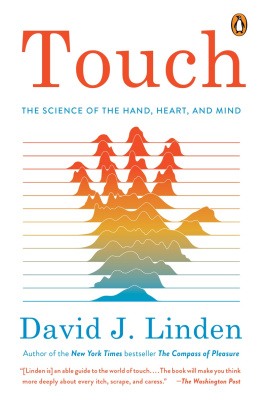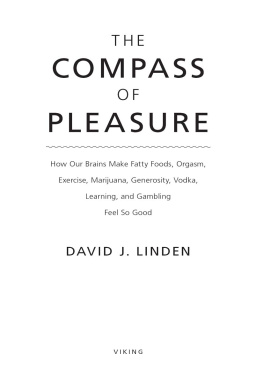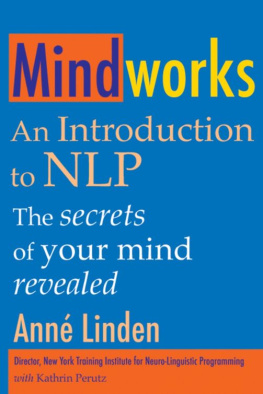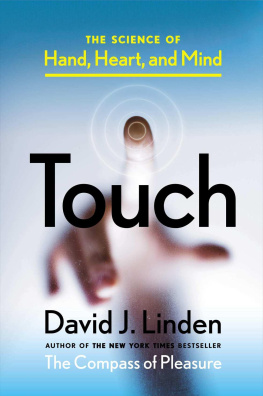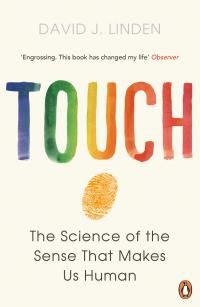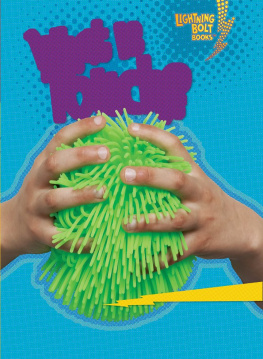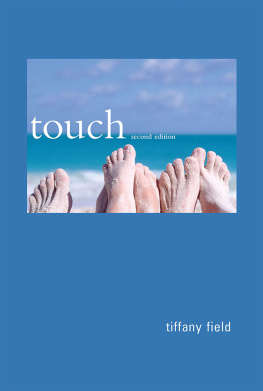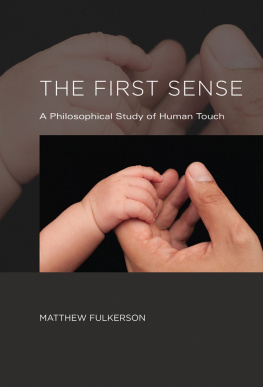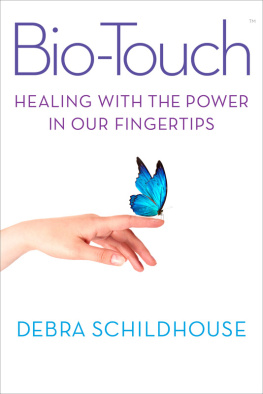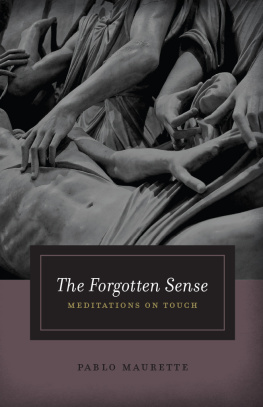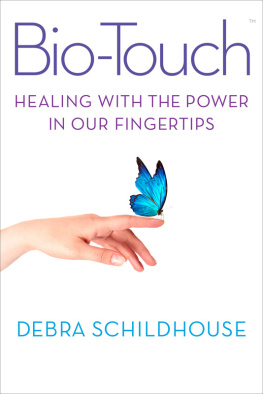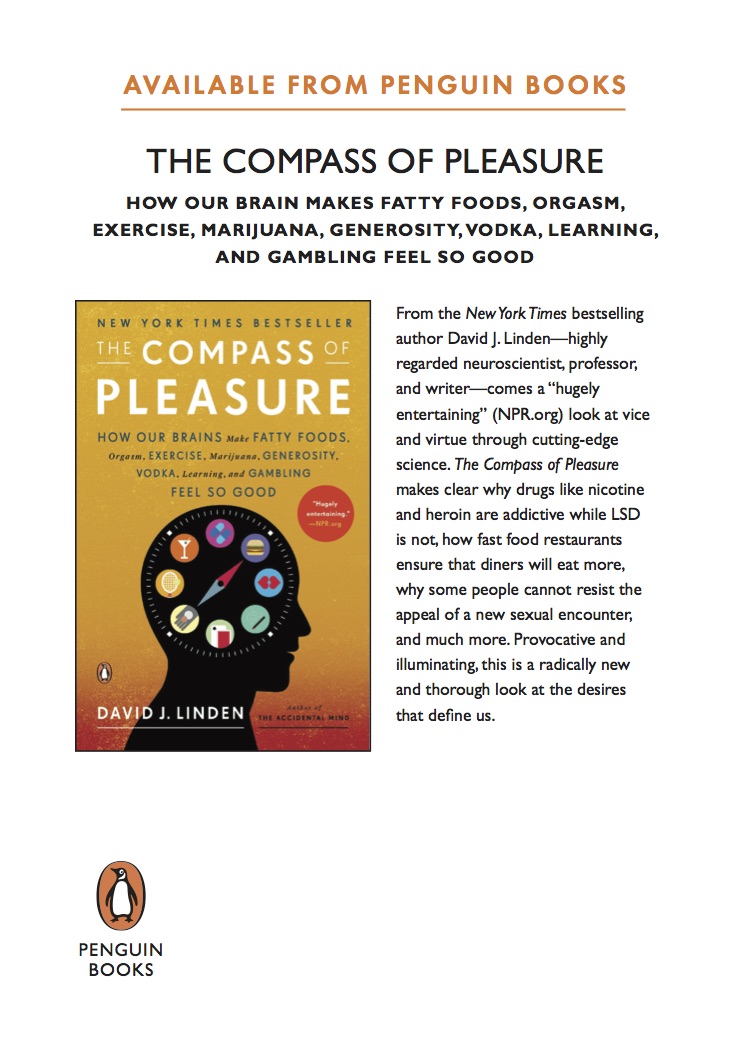ALSO BY DAVID J. LINDEN
The Compass of Pleasure
The Accidental Mind
PENGUIN BOOKS
An imprint of Penguin Random House LLC
375 Hudson Street
New York, New York 10014
penguin.com
First published in the United States of America by Viking Penguin, a member of Penguin Group (USA) LLC, 2015
Published in Penguin Books 2016
Copyright 2015 by David J. Linden
Penguin supports copyright. Copyright fuels creativity, encourages diverse voices, promotes free speech, and creates a vibrant culture. Thank you for buying an authorized edition of this book and for complying with copyright laws by not reproducing, scanning, or distributing any part of it in any form without permission. You are supporting writers and allowing Penguin to continue to publish books for every reader.
Illustration credits appear adjacent to the respective image. Illustrations without credit are by Joan M. K. Tycko; copyright 2015 by David J. Linden
eBook ISBN: 9781101617724
THE LIBRARY OF CONGRESS HAS CATALOGED THE HARDCOVER EDITION AS FOLLOWS:
Linden, David J., date.
Touch : the science of hand, heart, and mind / David J. Linden.
pages cm
Includes bibliographical references and index.
ISBN 9780670014873 (hc.)
ISBN 9780143128441 (pbk.)
1. TouchPhysiological aspects. 2. TouchPsychological aspects. 3. EmotionsPhysiological aspects. I. Title.
QP451.L57 2015
612.8'8dc23
2014038475
Cover design: Matt Dorfman
Version_2
In memory of Professor Steven Hsiao
A brilliant touch researcher
A warm friend
A man of hand, heart, and mind
CONTENTS
If soul may look and body touch, Which is the more blest?
W. B. Yeats, The Ladys Second Song, 1938
Seeings believing, but feelings the truth.
Thomas Fuller, Gnomologia, 1732
Praise for Touch
[Linden is] an able guide to the world of touch, with a true gift for simplifying the complex. (The illustrations and diagrams throughout the book help, too.) The book is packed with cocktail-party triviascientists believe that touch is the first sense to develop in utero; some people with schizophrenia can tickle themselvesand satisfying explanations of everyday tactile experiences.
Emily Anthes, The Washington Post
With a novelists flair for anecdote, Linden unpacks the science behind touch by revealing how the sense informs and motivates us in everyday situations.
Bob Grant, The Scientist
A book for the non-expert on the neuroscience of touch is very welcome, and I recommend this one enthusiastically. Its full of facts and explanations, many of which are totally cool and, some, even astonishing.... But what endears me to the book is not its clarity and its informativeness. What I love is its openness, and occasional insightfulness, about all the things we dont know.
Alva No, NPR.orgs 13.7: Cosmos & Culture blog
Touch: The Science of Hand, Heart and Mind , is a treasure trove for anyone wanting to decode the frisson of a lovers caress. After all, the skin, says Linden, is a social organ.
Cat Auer, Playboy
The best science writers infect you with their fascination for the subjectthats exactly what Linden achieves here.
Christian Jarrett, BBC Focus
This book is about the sense of touch, its by a professor of neuroscience at the Johns Hopkins School of Medicine, and its excellent. It will tell you why footballers hug each other when a goal is scored, why they are like vampire bats in this respect, and why some people like being the recipients of anal sex while others dont. David Linden tells us all of this with exactly the right degree of scientific dryness.
William Leith, The Spectator (UK)
Linden explores touch in depth, from itches to orgasms... and it makes for compelling reading.
Orlando Bird, Financial Times
Being out of touch, the American neuroscientist David J. Linden argues in his absorbing book, is not just something that happens to cabinet ministers.... The human brain contains 500 billion nerve cells and does not give up its secrets lightly. But following Lindens thread is profoundly worth it.
Oliver Moody, The Times (London)
Engrossing... This book has changed my own life in a small but significant way. My family joke that Im the woman who put the sal into salad as Ive spent my life grazing on uncooked veg. I now gulp down hot soup and feel the better for it. Thank you, David Linden.
Salley Vickers, The Guardian (London)
David J. Lindens Touch is a charming read that explains the science of touch in easily understandable terms. Anyone who is interested in human interactions and emotional connections will find this book interesting. Just as important, men and women who deal with intimacy disordersincluding love and sex addictionare likely to find this book enlightening from a disease and recovery standpoint.
Scott Brassart, Addiction.com
The Johns Hopkins neuroscientist leads us on a delightful tour of the science of touch, sharing discoveries that shed new light on this highly underappreciated sense.
Jill Suttie, Greater Good
If youre interested in the mechanics of your mind or you want to know why you itch and what you have in common with koalas, read this and you wont be disappointed. Touch: The Science of Hand, Heart, and Mind is a book to get your fingers on.
Terri Schlichenmeyer, Rockdale Citizen
The book is highly readable and laced with stories that are fascinating, funny, and surprising!
Viviane Crystal, The Best Reviews
Though the author includes a host of entertaining anecdotes, his narrative is consistently backed by solid science. So surpassing does Linden make touch seem that even turning the pages of his book becomes a pleasurable experience.
Kirkus Reviews
Why does sexual touch feel good? What is the difference between being touched on ones palm or shoulder? Of all the senses, touch is by far the most underrated, according to Johns Hopkins neuroscience professor Linden ( The Compass of Pleasure , 2011).... This in-depth, awareness-raising discussion of the effects of touch from head to toe and back again sheds light on a fascinating yet overlooked topic.
Donna Chavez, Booklist
The sensation of touch, so ubiquitous in how we interact with our world, gets a sensualist pop-biology treatment from Linden ( The Compass of Pleasure ), a professor of neuroscience at the Johns Hopkins University School of Medicine.... Though its not exactly a neurobiology primer, Linden sandwiches a surprising amount of anatomical information between the stories of bad hand jobs and children who die young because they cant feel pain.
Publishers Weekly
ABOUT THE AUTHOR
David J. Linden is a professor of neuroscience at the Johns Hopkins University School of Medicine. The author of The Accidental Mind (2007) and The Compass of Pleasure (2011), he served for many years as the chief editor of The Journal of Neurophysiology . He lives in Baltimore, Maryland, with his two children.
PROLOGUE
Malibu, Summer 1975
W ere eight teenage campers huddled around a fire ring, late at night. Piled up like puppies, spilling over rocks and stumps and the dusty bare dirt of the Santa Monica mountains, we smell of black sage and acorns and unwashed T-shirts. With no adults in sight and the soft cover of darkness, we give voice to our innermost pubescent thoughts.

